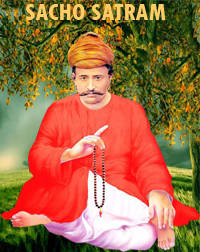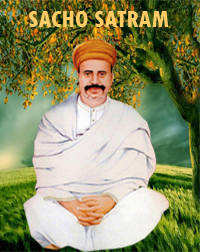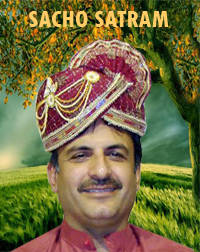We must remain vigilant and conscious at all times to avoid being the architects of our own downfall. When we knowingly commit wrongdoing, we invite our own destruction. Therefore, it is crucial to keep our eyes open, making wise choices and respecting the goodness in others.
Once, Shahanshah Satguru ventured to a town where the people spoke of a holy fakir, known for his piety and blessings. Eager to meet the fakir, Shahanshah Satguru informed his disciples. They set out on their journey, but to their surprise, the fakir met them on the way. Humble and gracious, the fakir insisted on coming to their location rather than causing them any trouble.Shahanshah Satguru assured to send food to the fakir in the afternoon, a gesture that filled the fakir with joy and honor. He agreed and awaited the prasad eagerly.
In the afternoon, Shahanshah Satguru assigned Bhai Raman, Sant Sai Kanwarram Saheb, and two others to deliver the food to the fakir. Bhai Raman, a mischievous soul who enjoyed playing pranks, had a different plan in mind. Upon reaching the fakir’s abode, he pretended to be unmarried and asked for blessings to get married, even though he was already married and had children. The fakir, irritated, asked him not to trouble him.
But Bhai Raman persisted, causing laughter among the onlookers. The fakir’s anger flared, and he warned Bhai Raman to cease his pestering, lest they all become muddled.
Everyone tried to intervene, but Bhai Raman persisted, emphasizing the chaos in the lives of those still unmarried, alluding to his own predicament.
This time, the fakir, incensed, cursed them, calling them penniless and blind.
Bhai Raman did not want to budge and kept bothering the fakir. Pnce again Bhai Raman jokingly requested the Fakir to bless him that he gets married.
Now the fakir got enraged and told Bhai Raman to get lost and called him the man with a burnt back.
Everyone was scared that the fakir might become more furious , so they told Bhai Raman to leave as soon as possible.
As the group departed, they knew their Satguru, Shahanshah Sai, who was omniscient, would learn of their misdeed.
On their way back, they lost their path and wandered aimlessly, feeling the effects of the fakir’s curse as they became confused and disoriented. Suddenly, they spotted a horsecart and approached the driver, explaining their desire to reach Shahanshah Satguru Sai Satramdas. The coachman agreed and asked them to pay 12 anaas but they had only about 8 to 10 anaas. when they sat in the carriage the coachman turn the horsecart, pointing to the crowd near Saijan, which they had failed to notice. It dawned on them that the fakir’s words had come true—first, they were lost, then they acted like blind men and were also short of money.
Fearful of their Satguru’s reaction, they attempted to hide from Saijan. But when Saijan started meeting his folowers they slowly moved ahead to meet Shahanshah Satguru Sai Satramdas Saheb.Those who would always stand in front were now trying to be behind others. As they approached Saijan, the all-knowing Saijan burst into laughter and remarked that everything the fakir had foretold had indeed come to pass, yet no one had been destined to possess the strength to burn their backs
This tale of Shahanshah Satguru teaches us not to act blindly or intentionally do wrong, for it leads to self-destruction. We should avoid troubling others and show respect for the good in people, especially our elders. Our actions should not tarnish the reputation of our predecessors. Instead, we should embrace goodness and foster it within society.
Remaining vigilant means staying aware of what is right and virtuous, and not intentionally sabotaging ourselves. Shahanshah Satguru assured us that, under the protection of our Satguru, we are invulnerable. No harm can befall us when we remain aware and committed to goodness.
True wisdom lies in recognizing our own ignorance. Our inner conscience knows the distinction between right and wrong. When making decisions, consulting our inner voice leads to the right path. We often concern ourselves with others’ opinions, but it is God who truly understands and rewards our actions. We are blessed with the gift of intellect, and our deeds, guided by our inner conscience, teachings of our Satguru, and dignity, ensure happiness in this life and the hereafter.



